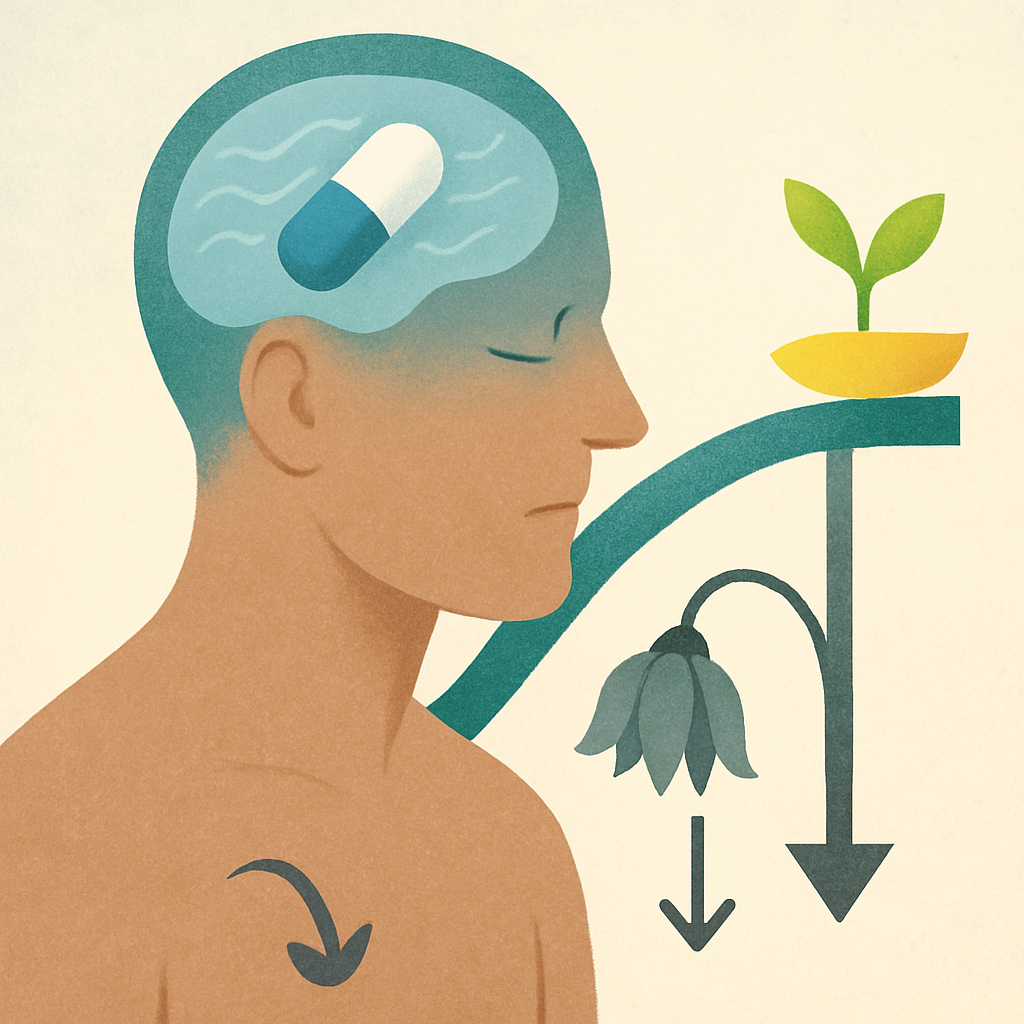A Common Trade-Off That Many Don’t Talk About
Anxiety can seriously interfere with daily life — including sexual performance. Many men turn to medications for relief, and for good reason: anxiety medications can be life-changing. But they often come with an unintended side effect — erectile dysfunction (ED). This puts men in a tough position: feeling calmer mentally, but struggling physically. Understanding how anxiety medications affect sexual function can help you make informed decisions and explore solutions that support both your emotional and sexual health.
How Anxiety Contributes to ED
Before discussing medication, it’s important to understand that anxiety itself can cause ED. When you’re anxious, your body activates the fight-or-flight response, which increases adrenaline and tightens blood vessels — the exact opposite of what’s needed for an erection. Anxiety also makes it hard to focus on sensation, stay relaxed, and feel connected to your partner. Performance anxiety is one of the most common causes of ED in younger men. So, treating anxiety is often necessary to break the cycle — but the treatment must be carefully managed.
Types of Anxiety Medications That Affect Erections
1. Selective Serotonin Reuptake Inhibitors (SSRIs)
Common drugs: sertraline, fluoxetine, paroxetine, escitalopram
SSRIs are widely prescribed for anxiety and depression. While effective for mood, they often cause sexual side effects, including:
- Reduced libido
- Difficulty achieving or maintaining erections
- Delayed ejaculation or inability to orgasm
These effects occur in up to 60% of users, and can continue for as long as the medication is taken.
2. Benzodiazepines
Common drugs: diazepam, lorazepam, clonazepam, alprazolam
These medications reduce anxiety quickly but are usually prescribed short-term due to the risk of dependency. Side effects include:
- Fatigue and sedation
- Diminished arousal
- Reduced blood flow to the penis
While they may calm anxiety in the moment, they often dampen sexual response and can impair erections, especially with long-term use.
3. Tricyclic Antidepressants and SNRIs
Less commonly prescribed, but still used in some cases, these medications also affect neurotransmitters like serotonin and norepinephrine. They have similar side effects to SSRIs, including ED, low libido, and delayed orgasm.
Why These Medications Affect Erections
These drugs alter brain chemistry, particularly serotonin levels. While serotonin helps regulate mood, it can also inhibit dopamine, the neurotransmitter most associated with desire and pleasure. In addition, some medications interfere with nitric oxide production, which is critical for blood vessel relaxation and erection quality. The result is often a reduced sexual response, even if emotional well-being improves.
You’re Not Alone — and It’s Not All or Nothing
Experiencing ED due to anxiety meds is common — but it doesn’t mean you have to choose between mental health and sexual health. There are strategies that allow you to treat anxiety effectively while preserving or restoring sexual function.
What You Can Do About It
1. Talk to Your Doctor — Honestly
Never stop or adjust your medication without medical guidance. Instead, speak openly with your provider about your symptoms. Many doctors can:
- Adjust the dosage
- Switch you to a different medication
- Add a supplemental treatment to offset side effects
2. Consider Alternative Medications
Some medications for anxiety have fewer sexual side effects, such as:
- Bupropion (Wellbutrin): often used for depression/anxiety and may even improve sexual function
- Buspirone: used for generalized anxiety with lower risk of ED
- Low-dose SSRIs: sometimes effective with fewer side effects when paired with lifestyle support
3. Support Your Body With Lifestyle Habits
Certain behaviors naturally reduce anxiety and support sexual health:
- Exercise: improves mood, increases testosterone, and boosts blood flow
- Mindfulness and breathing techniques: calm anxiety and reduce performance pressure
- Sleep and nutrition: essential for hormone balance and nervous system function
These habits may also allow you to use lower doses of medication with the same benefits.
4. Consider Therapy
Cognitive behavioral therapy (CBT) and other therapeutic approaches can reduce anxiety significantly without medication — or in combination with lower doses. Therapy also helps resolve the psychological aspects of ED, such as performance anxiety, fear of failure, or shame.
5. Explore Temporary ED Treatments
If ED persists while managing anxiety, your doctor may suggest medications like sildenafil (Viagra) or tadalafil (Cialis) to support erections short-term. These can be used safely with many anxiety medications, except for those involving nitrates or severe blood pressure issues.
Recovery Is Possible
Some men find that sexual function gradually returns as their body adjusts to a medication. Others may need to switch drugs or reduce their dose to find the right balance. Don’t settle for feeling emotionally stable but sexually disconnected — both parts of your well-being matter. With the right support, you can feel calm and confident in your body.
Final Thoughts: Treat the Whole Person
Anxiety and ED are deeply connected, and the path to healing involves understanding how mind and body interact. Anxiety medications can be essential tools — but they’re not the only tools. With the right combination of medical guidance, therapy, and healthy habits, it’s possible to manage anxiety without sacrificing your sexual health. You deserve both peace of mind and a satisfying sex life.
